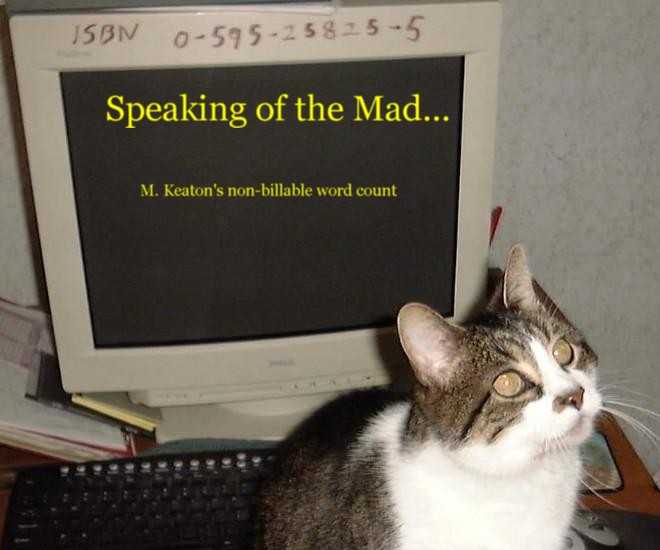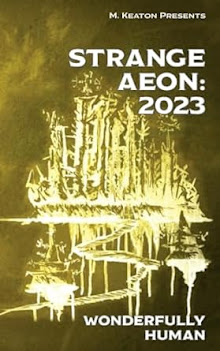Following up on the last post, I asked the Thin Man what he had as a long term goal, the one great future dream that he'd like to see happen. It seems he's given it a good deal of thought.
"Admittedly, it is an abominably ambitious undertaking for an author who has not published anything of note in several years and is effectively homeless but, better to ask for too much and fail than too little and fail. But...
There currently does not exist a place for authors of one generation to pass down their knowledge to the next in a natural and intuitive context. Writing workshops (such as Clarion) and hosts of ‘formal’ writing teaching are available but these forums are stilted, regimented, and (most importantly) confine themselves to a very narrow portion of the craft while neglecting others. Even writing itself is only a part of the broader experiences and knowledge that are necessary to create a true storyteller. Today’s writers have lost contact with their bardic roots—they no longer venture outside their comfort zone or chosen genre in their reading, they do not value the music of words that was once taught through poetry and song, they lack the sympathetic connection with their listeners that was once indispensable. Instead, they focus on marketing, web-based salesmanship, and the fine art of romancing a publisher. Despite its incredible usefulness as a tool, today’s authors have sacrificed too much to the internet and forget the irreplaceable value of direct human interaction. Conventions approach this memory but they are short in duration and frequently too hectic for real, meaningful progress to be made. In short, the modern author is too isolated, too misunderstood, and too undervalued (considered merely one more ‘entertainer’ in a medium that is dying anyway). They have begun to believe their public perception and grow increasingly ignorant of anything outside of their own small circle and have forfeited their larger role in society.
This all sounds terribly melodramatic and is probably perceived by the average person as a very bad case of “poor me, the misunderstood artist”. This is not the case. My argument is that it is the author who has grown lazy and now, a generation or so removed, no longer even knows where to turn to grow and develop even if he were to perceive a problem (which many do not). The bottom line is that most modern authors are more concerned with marketing and selling their work than telling a good story let alone with being the kind of artist who actually contributes to the field or leaves a legacy behind.
The purpose of a modern bard’s college remains the same as that of the colleges of old, enumerated in the three duties of a bard: to preserve the language, family, and culture.
In its final, envisioned stage the college should fulfill these duties by (in order of importance): 1-Providing a retreat for working authors where they can write in peace and quiet in a natural setting. 2-Provide and promote mentoring of younger authors and the sharing of support, experience, and companionship between authors. 3-Act as a resource to authors by providing access to specifically knowledgeable individuals (through a range of contacts in the college, throughout the community, and across the world from professional archeologists to master bricklayers) and providing, not only dry information, but the opportunity to participate and learn by doing. This is further facilitated by the permanent presence of a select group of teachers/artisans on site (see further). 4-Teach (via apprenticeship) the traditional bardic skills to anyone interested. (Specifically, this would include the making and playing of a range of musical instruments, a basic knowledge of glassblowing and smithing, animal husbandry, along with the more predictable “literary” skills.) 5-Be a resource to the community by making the services and teachings of the college available to the public (including through visits to schools and libraries as well as a “formal” course structure on site). 6-Provide a place of retreat, mentoring, and guidance to the youth of the area via the residents of the college. The populace of the college, both permanent and temporary, should be approachable by and even seek out area youth who are having difficulty and influence them in the right direction. This could range from helping a struggling student understand a difficult subject to encouraging a failing student to remain in school to making the proper contacts to insure that migrant children do not ‘fall through the cracks’ when they are relocated to mentoring troubled children to physically going with a concerned brother to physically drag his sister out of the drug den and giving her a place to stay until she can get cleaned up and into rehabilitation. This may seem like quite a stretch but is actually a logical progression. Authors tend to have diverse backgrounds and have survived through very difficult circumstances. They have a natural empathy and problem solving skills that they themselves rarely realize are present.
Obviously, this will require significant infrastructure: several hundred acres of land, dozens of buildings, and a wide range of sympathetic contacts just to scratch the surface. It was, therefore, my thought to implement the college in stages, a gradual expansion of the structure without any increase or decrease in scope of ambition. This growth cannot be spelled out step-by-step because it is too dependent on external circumstances. It will have to start with spreading the vision of and explaining the need for the college. As the number of sympathetic people grows, attention can then be turned to the physical and it will probably be necessary to change locations, from small to large, several times. The college will exist first as a group of individuals supporting the same goal, expand to some land where at least author’s retreats and physical meetings can take place, and then continue down the best avenues available when it reaches that point. On a personal note, I do not expect to see it move beyond this primitive stage in my lifetime—this is a massive undertaking.
The network of people is the heart of the college idea. Even when the college is a physical entity, it is the people, either by direct experience, word of mouth, or reputation of the college, who provide the real services. This network is not a support group or a writers guild; it is something much more ambitious. It is a collection of people who believe in the college and its goals and who are willing, therefore, to expend their own time and effort to support it. It is the university professor who calls an author to help a student and who, in turn, will help another, different author in the college find research for his book. It is that same student, who happens to know a bit about plumbing, teaching and helping a writer to fix the plumbing in the author’s home and then sending another student to the author for help. And if it is something that author cannot help with, then he can contact someone else in the college who can who will do it because it needs done. The backbone of the bard’s colleges has always been the people who, though not bards themselves, support it—not with lip-service but with deed—because they believe that it is important. It is an intermingled flow of labor and knowledge, a kind of intellectual property barter system that does not keep a ledger.
This element will be the most difficult to achieve. It will be slow to grow and have no immediate gain for the individuals involved. By necessity, even though the idea can be spread by print and electronic media, most ground will be gained by direct personal conversation and explanation (and thereby must rely on a certain degree of “cheerleading” and charisma that the project is currently lacking). To help this, I shall try to assemble most of the key documentation from the original lore of the colleges as well as some tentative outlines of possible courses I can teach. (At this stage, the teaching will have to be by presentations and seminars rather than a permanent classroom.) If these foundational concepts can be articulated clearly, the idea should outlive me even if I should fall ill or otherwise not be able to keep up with it. It may be possible to offer, via a website, a kind of subscription patronage service (donate $20, get a certificate that means nothing but reminds you that you are involved, etc.) or even maintain a listing of contacts. If we are extremely blessed, someone with energy will take up the banner and promote the cause independently. It may also be possible to get libraries and schools, as entities, to sign on to the idea and make their resources available.
For example, a library agrees to support the college. They put promotional material in their flyers, run document/periodical searches for college members for free or at odd hours, etc. In turn the college could offer an infrequent stream of guest authors to sign books, read to kids, and present the occasional class or seminar. A university library could offer the use of its facilities free or at a reduced rate, even from non-students and, in turn, members of the college could speak to various classes or give assorted presentations. The same model could probably be follow for companies. However, let me stress that this cannot be a quid pro quo arrangement—the college functions on a shared belief in the common good in the cause, not as a business or sense of obligations. By necessity, there will be those who give little and get a lot and vice versa. This is more important than it would appear because more writers are loath to give formal commitments but by nature overly generous when asked for a favor."
Tuesday, November 25, 2008
Subscribe to:
Post Comments (Atom)





















1 comment:
But MK, isn't "isolated, misunderstood, and undervalued" the *definition* of writers and poets, in any era? :)
And, thanks for being a little part of a "bard's college" for me. :)
--CHD
Post a Comment